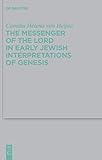The Messenger of the Lord in Early Jewish Interpretations of Genesis / Camilla Hélena von Heijne.
Material type: TextSeries: Beihefte zur Zeitschrift für die alttestamentliche Wissenschaft ; 412Publisher: Berlin ; Boston : De Gruyter, [2010]Copyright date: ©2010Description: 1 online resource (417 p.) : frontispieceContent type:
TextSeries: Beihefte zur Zeitschrift für die alttestamentliche Wissenschaft ; 412Publisher: Berlin ; Boston : De Gruyter, [2010]Copyright date: ©2010Description: 1 online resource (417 p.) : frontispieceContent type: - 9783110226843
- 9783110226850
- 222.1106 22/ger
- BS1199.A5 H45 2010
- online - DeGruyter
- Issued also in print.
| Item type | Current library | Call number | URL | Status | Notes | Barcode | |
|---|---|---|---|---|---|---|---|
 eBook
eBook
|
Biblioteca "Angelicum" Pont. Univ. S.Tommaso d'Aquino Nuvola online | online - DeGruyter (Browse shelf(Opens below)) | Online access | Not for loan (Accesso limitato) | Accesso per gli utenti autorizzati / Access for authorized users | (dgr)9783110226850 |
Dissertation Uppsala University 2008.
Frontmatter -- Contents -- 1. Defining the Issue -- 2. Early Jewish Exegesis – A Survey -- 3. The Ambiguous Identity of the Angel -- 4. The Angel of the Lord – Early Jewish Interpretations of Genesis -- 5. Comparative Analysis and Conclusions -- Backmatter
restricted access online access with authorization star
http://purl.org/coar/access_right/c_16ec
The focus of this book is on early Jewish interpretations of the ambiguous relationship between God and ‛the angel of the Lord/God’ in texts like Genesis 16, 22 and 31. Genesis 32 is included since it exhibits the same ambiguity and constitutes an inseparable part of the Jacob saga. The study is set in the wider context of the development of angelology and concepts of God in various forms of early Judaism.When identifying patterns of interpretation in Jewish texts, their chronological setting is less important than the nature of the biblical source texts. For example, a common pattern is the avoidance of anthropomorphism. In Genesis ‛the angel of the Lord’ generally seems to be a kind of impersonal extension of God, while later Jewish writings are characterized by a more individualized angelology, but the ambivalence between God and his angel remains in many interpretations. In Philo's works and Wisdom of Solomon, the ‛Logos’ and ‛Lady Wisdom’ respectively have assumed the role of the biblical ‛angel of the Lord’. Although the angelology of Second Temple Judaism had developed in the direction of seeing angels as distinct personalities, Judaism still had room for the idea of divine hypostases.
Issued also in print.
Mode of access: Internet via World Wide Web.
In English.
Description based on online resource; title from PDF title page (publisher's Web site, viewed 28. Feb 2023)


